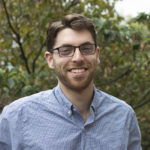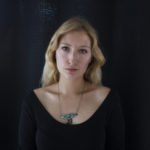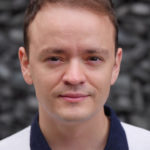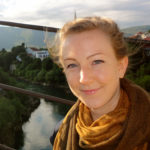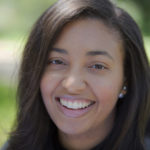The Team:
5 reporters, 2 field producers, 1 van

Crossing the Divide brings together a team of five reporters from red states and blue states to travel across the country together in a van, exploring issues that divide us and stories that unite us. Two additional journalists are accompanying the team as field producers. Read about the team, including personal essays from each of the reporters, below.
The Team:
Eric Bosco, writer & reporter
Nickname: EB
Age: 24
High school: Brockton High School, Brockton, Massachusetts
Degree: B.A. in Journalism, University of Massachusetts, Amherst
#1 song on your road trip playlist: “Rollin” by Calvin Harris (feat. Future and Khalid)
Favorite book: Fear and Loathing on the Campaign Trail ‘72 by Hunter S. Thompson
Favorite movie: The Departed
Wildcard fact or quirk: The first time I flew in a plane, I jumped out of it…skydiving.
Link to a piece of work you’re really proud of: UMass police helped keep student’s addiction secret for The Boston Globe
Something you’re packing that you don’t need: My basketball sneakers (I don’t wear them unless I’m shooting hoops)
Some lead pencil-filled ovals set me on a path separate from many of my peers in the urban and underfunded school district of Brockton, Massachusetts. When I was in third grade, I was identified as “gifted and talented” because I did well on a test. My best friend took the very same test and didn’t get chosen as “talented and gifted” because he wasn’t much of a test taker. He was a bit immature and rambunctious, but just as intelligent as I was. But that didn’t show up in the test figures. I certainly wasn’t thinking, at that age, about the implications of setting up some kids for success in a large urban school district, while letting the others languish.
When I went to college, I had no clue I wanted to be a journalist. But in retrospect, it makes a lot of sense. My mother works as a secretary at my old high school, and cares deeply about listening to others and being compassionate. My dad has always been an engaged citizen, advocating for the quality of my neighborhood for as long as I can remember.
He never went to college, but as a water purification technician, my dad was uniquely equipped to see that a natural gas power plant proposing to use treated sewer water in its cooling towers would be dangerous for our community. The chemical mist emanating from the towers would exacerbate the already-high levels of pollution in the city. (Brockton ranks among the highest in the state in childhood asthma-related hospitalizations.)
I remember my dad presenting that evidence in his case against the proposed plant a decade ago at our dinner table and in city council chambers. He and a group of concerned citizens helped craft and file a city ordinance, mandating majority approval from the city council for the use of treated sewer water in the cooling towers. The council has maintained opposition to the plant, despite support for the project from the mayor’s office. To this day, the plant has not been built.
My dad and I often come at discussions about national politics from opposite ends — a dinner table divide, if you will — but I always valued his political insights about Brockton. The fact that he spoke up and fought the proposed power plant shows how much he cares about my family and the house that’s been in my family for two generations. But it also meant that he fought for the neighborhood — the underrepresented and minority families that were unaware of or misinformed about the plant, and the kids in the elementary schools near the site they wanted to build it on.
Even though my dad didn’t go to college, he taught me that you didn’t have to have a degree to be an engaged citizen, or to make positive change in your community.
So when I went to UMass Amherst, I paid attention to my community — and I learned about a student’s overdose death. His death came amidst a crackdown by campus police on UMass’ party school reputation. I learned from talking to my classmates that the student who died had been a confidential informant for the campus police. I learned the police had made a deal with him not to tell his parents about his drug use if he would help them bust other student drug dealers. They equipped him with a “wire” and used to arrest another campus dealer. I connected with the deceased student’s mom who told me if the police had told her sooner about her son’s drug use, she would have gotten him help.
The story came to light in the A1 section of the Sunday Boston Globe. It led to the campus police shutting down the confidential informant program.
I know now that I may not have picked up on the story or connected the dots without the eagerness to listen I picked up from my mother, my father’s critical eye and the skills and ethics I learned from the world-class faculty in the UMass Journalism Department. I’ll carry their lessons with me on the road this fall — and on the road to becoming a journalist who helps bridge divides.
The Team:
Brittany Greeson, photojournalist
Nickname: My friends sometimes call me “BGreesy” and my mom calls me Nicky because of my middle name
Age: 24
High school: Daviess County High School, Owensboro, Kentucky
Degree: B.A. in Sociology (expected spring 2018), Western Kentucky University
#1 song on your road trip playlist: There are way too many good songs out there to proclaim a #1, but “Pony” by Ginuwine is an obvious classic.
Favorite book: It’s not a book, but one of my favorite articles of all time is called “The Last Day of Her Life.” Legit had me sobbing. I read articles way, way more than books.
Favorite movie: How does one have a favorite? There are too many films and genres. Right now it’s definitely “Moonlight.”
Wildcard fun fact or quirk: I went through an unfortunate middle school goth stage. Eyeliner and all. I still love My Chemical Romance.
Link to a piece of work you’re really proud of: Beyond Water for The New York Times
Something you’re packing that you don’t need: A travel-sized bottle of some sort of hot sauce.
There is a transformation that occurs when you’re a person from lower class roots who somehow ends up jumping into a middle- and upper-class world. I’m only 24 now but I know the divide because I’ve lived on it everyday. I was on assignment for The New York Times three months ago to photograph a private school. The place looked like Hogwarts to me. I almost started crying because I realized that I was never given access to those nice facilities and opportunities throughout my schooling. Through my camera, my profession, my collegiate achievements, I was given this exclusive invitation to a part of the world I had no idea existed the previous 18-plus years. Not only to photograph it but to inhabit it too. But I never felt like I fit in.
It’s an invitation I would have never gotten had I not been afforded rare opportunities and mentors. During my early days as a photojournalist, I felt like an imposter: A blue collar girl teaching herself to adopt white collar mannerisms. As you get deeper and deeper into this world it’s easy to reject those previous parts of yourself that made you, well, you. You go along with the narrow jokes, wear the right clothes, pretend you’ve “made it” because you live in a town that has more than 100,000 people.
Like many of my colleagues, when the election results rolled in I was actually surprised. It was then that I realized I had dug a divide between myself and my roots so deep that it hindered my ability to properly observe the world. That’s the divide I see today in my home state of Kentucky, a divide that is present across the country: a divide between classes, a divide between east and west, a divide along party lines, a divide along racial lines. Blame is passed onto various groups for the state’s socioeconomic issues.
My approach to reporting on this trip will be a tribute to vulnerability and honesty. Honesty with myself and with the many people we meet along the way. One part self-discovery, four parts investment. In others, their stories and the many things that make them vulnerable as well. It’s often been that we put a divide between ourselves and our subjects. However, I’ve always felt compelled to tear that down and break tradition. Not only because it forms a collaboration, but also because had I not been given a certain opportunity, I would have easily become the person in front of the camera. Yet, because of my background, the many experiences I’ve had, both traumatic and awe-inspiring, I find myself relating to the people I photograph more than the people I stand side by side with at conferences and workshops. That’s why I do this, for those intimate interactions that instill a deep affection for humanity. For those who haven’t been granted the power or access to amplify their own voices.
There was a moment in elementary school that still feels vivid. I had stringy hair and lanky legs. I remember loading up in a van and was whisked away to K-mart for the day. Alongside the volunteers, I got to pick out any clothes I wanted from the racks. It felt like Christmas, but it was actually a public school program that purchased new school clothes for underprivileged kids. Imagine waking up sixteen years later and you’re documenting underprivileged kids for work. One of them tells you they want to be just like you one day.
This has led me to a point where I have to ask myself, face pushed into the viewfinder, would I have wanted to be photographed this way? Would I have wanted readers to pity me? What type of photographer would I have wanted to tell my story or the stories of those I grew up with? My mom wouldn’t have wanted me photographed at that K-Mart. She had pride in all her hard work that put food on the table, and I’ll definitely be getting a phone call when she reads this.
However, I think in being an open book, in telling my own struggles, I can bring light to why I photograph the way I do. I intend to apply that thoughtfulness as we cross the divide in all regions of the country. To use my skills as a way of mending the lines of communication and to peel back the filters over what we see — so that visual storytelling is not only inclusive, but authentic.
The Team:
Gabriel Sanchez, writer & reporter
Nickname: Squire
Age: 29
High school: Worthington Senior High School, Worthington, Minnesota
Degree: B.A. in journalism, University of Minnesota, Minneapolis
#1 song on your roadtrip playlist: “Ojos Asi” by Shakira
Favorite book: Catch-22 by Joseph Heller
Favorite movie: Women on the Verge of a Nervous Breakdown
Wildcard fun fact or quirk: I speak Spanish, German and some French
Link to a piece you’re really proud of: U.S. political divide a challenge for Supreme Court independence
Something you’re packing that you don’t need: Nintendo 3DS
It’s difficult growing up in twilight. After immigrating to the United States from Caracas, Venezuela, when I was eight, I was never regarded as American or Venezuelan. I was in two worlds but not embraced by either. American culture was alien to me, and I was nothing but a visitor to my native country and culture.
When we arrived in Worthington, Minnesota, one question comprised the entirety of my English-language arsenal: “Where is my mother?” Given that limitation, my elementary school recommended that I be enrolled in English-language instruction and the Boy Scouts of America. The need for English lessons was evident, but the Boy Scouts were suggested to accelerate assimilation and diminish effeminacy.
Though I could not communicate with my English-speaking peers, I was relieved to see that there was a prominent group of people from Central America in Worthington. That relief was short-lived, however, because my sister and I were summarily labelled “fresas.” Fresa — a Latin-American pejorative used to refer to Latinos who have become Americanized — was used to set us apart from the Latinos, while our immigrant status set us apart from the Americans.
Time passed and I learned English, lost my accent and assimilated so thoroughly that I was finally able to pass as an American. Passing, however, came at a cost. When corresponding with my family in Venezuela, they would invariably comment on how bad my Spanish had become and how I behaved as a “German” or “English” man. It didn’t help that we also stopped attending mass, as my family back home were devoutly Catholic. Despite being a former Marine and obtaining my bachelor’s degree, my grandmother laments that I never became a “great Venezuelan man.” Her bouncy Venezuelan boy became a serious American man.
As we explore the Somali community’s experience in Minnesota, I will approach the reporting with empathy. Many Somalis, like many Venezuelans, left their native land to flee from wanton strife. I hope this common ground will help me understand their perspectives and tribulations. It is my duty to relate their stories, to help cultivate a dawn of informed coexistence.
The Team:
Rachel Cramer, audio reporter
Age: 27
High School: Guthrie Center High School, Guthrie Center, Iowa
Degrees: B.A. Biological/Pre-Medical Illustration with minors in Spanish and Anthropology, Iowa State University; M.S. Environmental Studies, University of Montana, Missoula
#1 song on your roadtrip playlist: “Daphne” by Lia Ices
Favorite book: To Kill a Mockingbird
Favorite movie: When Harry Met Sally
Wildcard fun fact or quirk: I’ve hitchhiked in Costa Rica, Slovenia and Iceland
Link to a pice of work you’re really proud of: Iraq’s Future is Uncertain, but Young Leaders Dream Big While in Montana for Montana Public Radio
Something you’re packing that you don’t need: The card game “Sushi Go.”
In April, another reporter from Montana Public Radio and I attended one of the campaign stops for Greg Gianforte, who was then the Republican candidate for Montana’s U.S. House seat.
Donald Trump Jr. was traveling with Gianforte to show support and raise money for the Congressional hopeful. About 600 people packed into the Hamilton Fairgrounds to see Gianforte and Trump Jr. while 125 protested across the street. I crossed back and forth between the two groups with my audio recorder and observed the interactions.
“Montana’s not for sale!” chanted the protesters.
“Go back to where you came from, you [expletive] liberals!” yelled a passerby.
When I interviewed the event organizer — a white-haired woman with a cross pinned to her blouse — I wondered whether her values were really so different from those of the protester outside.
But it’s difficult to cram in nuance and underlying motivations with a 5 o’clock reporting deadline and a 90 second time-slot. That’s one of the reasons I’m excited about the Crossing the Divide Fellowship. Working with a team of talented journalists and editors, we will use our diverse skills and experiences to dive into the grey areas of contentious issues and reveal their subtle shades. My hope is that our work will increase understanding and empathy on all sides. Both are needed if diverse groups of people are going to ‘cross the divide’ at the local and national level.
I grew up in a small, rural community in Iowa. At the time, we didn’t have a traffic light in the county, and I doubt there’s one there now. Perhaps knowing this you’re already filling in the gaps with your imagination — yes, there’s a lot of corn. But like any place and the people who inhabit it, reality is always more complicated and far richer than a stereotype. I danced at quinceañeras, watched the sky turn green from a tornado, and shook hands with Barak Obama on the campaign trail. And no, not all of Iowa is flat.
Good journalism breaks down assumptions, and shows that behind every story, there’s another story waiting to be told. Public radio was the first medium that showed me this. From Terry Gross’s in-depth interview with Bill Clinton on “Fresh Air” to Garrison Keillor’s description of the Minnesota State Fair on “A Prairie Home Companion,” public radio broadened my worldview and enriched my daily life.
I caught the journalism bug during my Princeton in Asia Fellowship in Sri Lanka with the International Water Management Institute. My primary task was to transform complex science research into online articles that an intelligent 12-year- old could understand. Most of my work was from an office but, in 2014, I assisted IWMI’s photographer in the creation of “How Bangladesh turns toilet waste into high-value compost,” a photostory that was featured in The Guardian. I later traveled to Ethiopia to cover water solutions in agriculture. I interviewed urban farmers, women entrepreneurs, extension agents and flower farm laborers with the help of a translator.
Both trips were exhausting but highly rewarding. I enjoyed coming back to my hotel room each night to listen to audio recordings and pick out the quotes. I also liked traveling with a team. How else would I have learned about flash settings on a camera or the best Ethiopian pop stars?
After the fellowship, I pursued a master’s degree in Environmental Studies at the University of Montana. While I was interviewing Hmong Americans for my thesis on cultural and agricultural adaptation, Missoula welcomed a new wave of refugees from Africa and the Middle East. Refugee resettlement, however, is a contentious issue across the state. Anti-refugee/immigrant rhetoric has grown over the last year and is reflected in some of the bills proposed during the last legislative session.
During this time, I also started working for Montana Public Radio, first as a website assistant and then as an evening newscaster and reporter. The experience has been invaluable. With the support and mentorship of a talented news team, I have learned how to report daily news in a fast-paced setting and how journalists can leverage sound to create compelling stories. From voter access on the Blackfoot Reservation to wolf-rancher conflict near Yellowstone, I’ve reported on a wide range of issues.
Through this fellowship, I aim to further explore how rural communities adapt to change. Drought, wildfires, and the shrinking number of mining and timber jobs have had a significant impact on communities across Montana. With livelihoods and ways of life at risk, I understand why divides form over the use of natural resources. However, I am most interested in how communities overcome these divides and find a way to thrive, even in the face of climate change. This theme of adaptation is not unique to Montana, and as our team travels across the U.S., we will investigate how communities strive for a better future.
The Team:
Mahlia Posey, videographer & reporter
Age: 25
High School: Faith Lutheran High School, Las Vegas, Nevada
Degrees: B.A. English, Howard University; M.A. Journalism, U.C. Berkeley, Graduate School of Journalism
#1 song on your roadtrip playlist: “Perm” by Bruno Mars
Favorite book: I have lots of favorites, but right now I’m reading “Neon Soul” by Alex Elle, and it’s making its way onto my list of favorites
Favorite movie: Love and Basketball
Wildcard fun fact or quirk: A quirk that most people find shocking is that I don’t like dogs
Link to a piece of work you’re really proud of: Makes Me Wanna Holler. I’m mostly proud of this because I finished it when I didn’t think I could.
Something you’re packing that you don’t need: I always overpack, so I’ll probably bring an extra pair of shoes I don’t need.
I identify as an American, but despite living in the United States of America, I straddled two different societies: “one white, one black — separate and unequal.” That’s the language from the 1968 Kerner Commission Report, a special report by President Lyndon Johnson looking into the cause of urban race riots and rebellions that happened every summer from 1964-1967. Fifty years later, this language still describes my experience.
I am a video journalist because I love telling real stories about my America. My America does not include viral cat videos, celebrity gossip or inaccurate representations of minorities, because my America is too poor for pop culture. My America does not revolve around the latest fashion or food trends, celebrities’ life updates or taking a look inside a TV reporter’s new apartment. My America doesn’t know about the importance of organic food or the Clean Air Act. My America is too concerned about its reality.
The reality is that my America is made up of poor and middle class millennial people of color and their parents living in a society that has never been inclusive, since the founding of this nation. The reality is my America faces extinction due to a public housing crisis, community crime, police brutality, and food deserts. The mainstream media often ignores my America, unless it’s about violence. That is problematic because it shapes the perspective of the other America.
The Pew Research Center’s 2014 report, The Next America, found more than 40 percent of millennials are people of color who live with their parents. On top of that, people of color only make up 12% of daily newsrooms across the United States, according to the 2013 American Society of News Editors newsroom census. To me those data mean more than 40% of people are not seeing their stories in the news.
I want to be a journalist who provides the people who inhabit my America with an accurate reflection of their lives. My approach to reporting is to always make sure I’m accurately reflecting the community my pieces serve. I strive to make sure my America is accurately reflected to help educate the rest of America during these divisive times. And while I love my America and reporting on it, I don’t want to be ignorant to what’s going on in the rest of America.
I want to know and understand Americans who care about the latest celebrity gossip or animal rights or the environment. I want to learn more about the pockets of America that I don’t interact with everyday or understand. I approach reporting pieces in the Americas that I don’t understand in the same way I approach stories in my America: by accurately reflecting the community I serve.
The Team:
Ben Brody, field producer
Ben is one of two field producers traveling with the team of reporters for Crossing the Divide. He’s a photojournalist and writer who has been working for The GroundTruth Project and GlobalPost since 2010, with assignments in Afghanistan, Egypt and the United States. He has a degree in journalism from the University of Massachusetts Amherst and an MFA in photography from Hartford Art School. Since 2003 he has been an observer of evolving military culture and doctrine, and how it reflects the changing American character and political identity. His work in Iraq from 2005 to 2008 was published in “Photojournalists on War: The Untold Stories from Iraq,” by Michael Kamber. His photo story “Endgame: Afghanistan” was recognized by the Leica Oskar Barnack Awards, LensCulture Exposure Awards and Photolucida’s Critical Mass Awards in 2014.
The Team:
Qainat Khan, field producer
Qainat is The GroundTruth Project’s digital editor and one of two field producers traveling with the team of reporters for Crossing the Divide. She came to GroundTruth from local and national public radio programs, where she worked as a writer, producer, reporter and digital editor. She has a master’s in journalism from Columbia University and interned at StoryCorps, the national oral history project. She got her undergraduate degree at Colby College, where she studied Music and Gender Studies. Qainat was born in Tanzania and grew up in Fresno, California.


